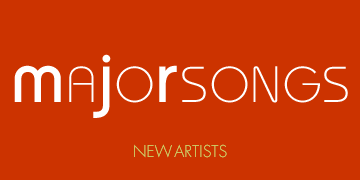
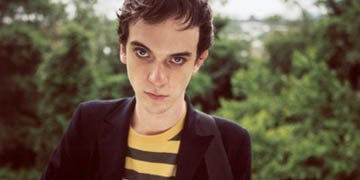
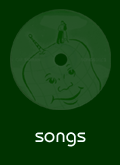
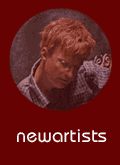
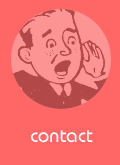
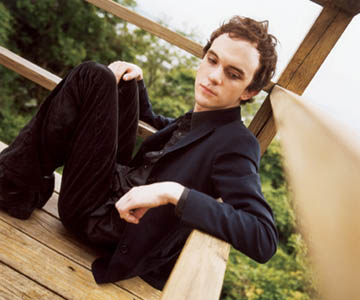
ANONYMOUS
by KIERAN McGEE: In His Own Words
(All Songs Written by Kieran McGee, Drunken Cow Music(BMI)/ Major Songs, administered by Bug Music)Faithless
__ "I'm gone, gone, gone, no two ways about it/ Gone, gone, gone, I don't believe in anything/ Gone, gone, gone, I'm faithless and I'm on my own..."
__ At the time of the last record, I was pursuing different religions, trying to see if one was right for me, because I had sort of given up on Christianity in a way and felt there must be a different answer. I guess on this record it's sort of like giving up. Not saying I'm never gonna be a religious person or anything, or have faith in anything. But at the moment that's how I felt and that's why I wrote this song. And I definitely was listening to the Carter Family when I wrote it, that's probably the musical influence.
Good Enough
__ "I know I'm not what I could be/ Yes and I know you don't need eyes to see/ Yes and I know you're good enough, good enough for me..."
__ This was written in a really weird random tuning, I just made up the song with whatever chords I could come up with. When we started the album, Steve said, "This is half of a song, you need to write another verse." I couldn't come up with anything for weeks. When I originally wrote it, I took a couple of lines out of a Bible passage, that's how I got the lyrics. Now, the day we were gonna record, I was walking to the train and a guy somehow magically handed me one of those religious pamphlets. I wrote the rest of the song on the train on the way to the studio.Odessa
__ "Poor Odessa in the Hotel Grand, a picture of decadence/ Sprawled across the bed, a bottle of pills in her hand/ Down a hallway lined with mirrors, her lovers come and go/ But nothing escapes, not even a tear..."
__ It's not the place, it's about a person. I wrote it after listening to this Maybelle Carter record for a week, so the melody is influenced by that song "Come All Ye Fair and Tender Ladies." It was about a specific person, or two people that I knew but as one character. Then a month later I realized it's more about me than anyone else. So if Odessa was a real person, she would be a composite of a couple of people I know - and myself. This one kind of came out of nowhere.Waiting For A Friend
__ "I'm just waiting for a friend, who won't turn his head/ Every time that he sees me in the city/ Waiting for the girl, who knows how I feel/ She could love me for a lifetime, make me happy."
__ I was going somewhere and saw this person that I knew. And they kind of brushed me off, pretended they didn't see me, and I got pissed off about it, and went home and wrote a song. This is another one from a couple of years ago, but then I had a similar experience after I wrote it, so that gave me more reason to redo the verses when we went in to record. It started out as a Todd Rundgren pop song I guess, but now it's more like a Dylan kind of thing, with more anger than the original version.Don't Lie Down
__ "Come on down, we will live forever/ I'll show you around, the only place I know/ Hold you down, so that you don't choke/ Falling out, on the floor in my bedroom..."
__ This is more about a drug overdose than anything, specifically my friend who died, which is another recurring theme on the album. That's what it's about, plain and simple. I realize that one of the lyrics, "I know I'm going to see you again," almost negates "Faithless" - if I don't have any faith, how can I believe that there's an afterlife in this song? It's kind of confused. I still think about her all the time, pretty much everyday, so it's hard not to write about it. I kind of don't wanna continue writing about it, but it still comes out sometimes.I Guess I Lied Again
__ "Talkin' in your sleep, I can't understand a word/ I'm feeling weak, but I'm gonna try again/ To make you want me, with innocent words that I speak/ Oh oh oh, I guess I lied again..."
__ I know I was up til seven in the morning when I wrote that, so it kind of came out of nowhere. I remember telling Jeremiah that when I wrote it I was in a bar and I was sitting next to some guy who was hitting on a girl, so I was writing it as if I were that guy.Losing You Again
__ "How about another second chance?/ You laugh at me trying to dance/ I try but I stumble, our song is much too fast/ It makes me spin and flashback to the past..."
__ It's about the last relationship I was in, a very tumultuous one where we'd break up for one week, and the next week get back together, back and forth for five years. So it's about trying to make things work, when it just keeps falling apart and then gets better again. It was the simplest way I could describe those five years, which were incredibly frustrating. Those kinds of relationships can also be the most passionate ones, but not necessarily a good kind of passion.Lonesome Road
__ "I'm a-walkin' that lonesome road, yes I am (yes I am)/ I'm a-walkin' that lonesome road, yes I am (yes I am)/ I'm a-walkin' that lonesome road, and I don't know where to go/ Walkin' that lonesome road, yes I am (yes I am)..."
__ This one was written in a Winnebago when we were driving to Oklahoma, while I was reading The Myth of Sisyphus. It's sort of like a Woody Guthrie song, so it's really basic. But it questions life, if there's any purpose to it, if there really is any reason to go on in the end. Once you roll the stone up to the top, it falls all the way back down, and the endlessness of it, that was his punishment. I just wanted to write a little Woody Guthrie-type road song.Quiet
__ "Being alone in your station wagon, that was dirty and gray/ Behind the window you were praying/ Voices whispered echoing the pain..."
__ I had a friend in high school who committed suicide over some girl. He was really young and I wasn't particularly close to him, but me and him and another guy would hang out almost everyday, for a year and a half. It was probably the first time I had ever been to a wake, that was kind of a weird experience. All my friends were there, but I'd lost touch with them in the last year before he died, so it was sort of surreal. I had never written anything about it, and then just wrote the whole song in fifteen minutes.The Second Time (Nobody)
__ "Saw her dancing on the highway/ Tried to reach her, then she slipped away/ Hey world, stop turning/ Because I want to get off..."
__ I was making up the lyrics as we went along when we recorded it. I've performed it for a long time, but every time I do it with different lyrics, so I did the same thing when we recorded it. Part of it has to do with the girl I was in the last relationship with, seeing her on the street, even though she's not still alive, like seeing a ghost. I'll go into a bar and see three people who look exactly like her. And it's too much, so I have to go write about it, don't really know what else to do. I don't go to a shrink or anything, so I have to go write it in the notebook.Hope
__ "Hope is a hungry game that we play/ You keep your guilt concealed and it shows/ Someday your thoughts will take their toll on you/ If I could lie to you, my wishes would come true..."
__ The oldest song on the record, I wrote it before "Ash Wednesday." I was listening to a lot of Leonard Cohen, so it's not the most uplifting song in the world. I was trying to learn flat picking at the time and doing the Maybelle Carter strum, so that's how it's played, just solo with harmonica. I've been trying to learn that style for a long time, trying to perfect it as much as I can. I can't believe that I'm putting a song on this album that I wrote when I was 16. And now I'm 23.Big Surprise
__ "Who could I fool?/ The nightlife hands just dragged me in a big surprise/ I stole you from your mama's eyes/ You found a way to my head somewhere up in space..."
__ It's about this girl I dated very briefly and about almost getting busted by the cops at her place. She got busted. I got away okay. It's half about that one incident and half about the relationship in general. That would be the beginning of the lost weekend. Definitely a dangerous girl. I only dated her for about two months, but what she was into wound up taking up the next two to three years.Anonymous
__ I saw that black smoke rise, and I am washed in the blood/ I saw that black smoke rise, up above me, up above me..."
__ That was just a title I had and wanted to use it in a song. So I just stuck it on that song because I couldn't think of another title. It seemed to fit I guess. Everyone seems to think it's about 9/11, but it has nothing to do with 9/11. It's actually kind of another drug overdose song. But where "Don't Lie Down" is more literal, this is much more abstract. They're probably the darkest lyrics on the record, with a lot of blood in it.Media Contact:
Carla Parisi / Wrecking Ball Media
973-846-0041 / [email protected] >>
Kieran McGee
At age six, when his friends were getting G.I. Joe for Christmas, young Kieran McGee's father gave him a cassette of Robert Johnson, and gave Kieran's older brother a Guns N' Roses cassette. "I immediately liked both albums," Kieran recalls, "but Robert Johnson was the more lasting impression, I think." The bipolar extremes of rock and folk - the King Of the Delta Blues and hair-metal's primal scream - have been the heart and soul of Kieran's music ever since. Along with the influences that have washed up on the rocky shore of his life - Woody Guthrie, Skip James, Black Flag, Nirvana, the Carter Family, and of course Bob Dylan and the Rolling Stones - Kieran McGee is, as one New York journalist proclaimed, "the real thing."
If it seems that Kieran has been driven by nothing but music since childhood, well, "that's about it, plain and simple," as he would say. From banging around pots and pans on the kitchen floor, to making up his own melodies when he was six or seven and writing his first songs down in notebooks (that he still owns), taping his songs and later figuring out how to work his first 4-track Yamaha machine around age ten, to writing all the songs for his first album at age 14, recording it at 15, and hitting the road to promote it during the summer he turned 16 - it's been a straight shot for folk-punk's youngest laureate. With more than his fair share of stormy detours and lost weekends along the way.
__ ANONYMOUS, the third full-length album by 23-year old Kieran McGee, builds on the experiences that coursed through his 1997 debut, Left For Dead, and its independently released follow-up of 2001, Ash Wednesday. The new album picks up on themes of faith (religious and otherwise, in "Faithless" and "Good Enough"), self-worth ("Waiting For a Friend," "I Guess I Lied Again"), dangerous girls ("Odessa," "Big Surprise"), the stillness of death ("Quiet"), ghosts ("The Second Time"), guilt ("Hope"), more than one breakup ("Losing You Again"), more than one drug overdose of a close friend ("Don't Lie Down," "Anonymous"), and the Myth Of Sisyphus ("Lonesome Road").
__ The new album was produced by Steve Rosenthal, known for his recent work in the studio with Ollabelle, the homegrown group signed to T-Bone Burnett's DMZ label (via Columbia Records). Ollabelle's rhythm section (bassist Byron Isaacs, keyboardist and guitarist Jimi Zhivago, drummer Tony Leone) accompanies Kieran throughout most of ANONYMOUS, proving themselves on tunes that range from twangy country ballads to bashing rock numbers to the bruised and bloody title track. "Lonesome Road" turns into a Woody Guthrie road song hootenanny with banjo, guitar, mandolin, dobro and a spirited singalong chorus.
__ The drum seat for the opening number, "Faithless," is taken over by the legendary Levon Helm of The Band. Levon's daughter Amy Helm is one of the two female vocalists in Ollabelle, and she adds a sweet Virginia touch to "Odessa." Sonic Youth drummer Steve Shelley shows up on four tracks, and lets it thrash on "The Second Time" and "Big Surprise." "Don't Lie Down" and "Waiting For a Friend" feature Southern blues guitar phenom Sean Costello (who is only a year older than Kieran, and cut his first album a year before Kieran's, which makes them contemporaries). Guitar chores on nearly all the remaining tracks are handled by Kieran's longtime accompanist Jeremiah Lockwood.
The exceptions are the moody "Quiet," an elegy which Kieran fingerpicks on acoustic guitar accompanied by Zhivago on keyboard; and "Hope," a solo by Kieran on guitar and lavaliere harmonica, a traditional folk style he's been working on for some time. It happens to be a song that he wrote when he was 16, and he is frankly amazed that he had the balls to put it on an album that's coming out when he's 23.
__ ANONYMOUS is the latest album release from Stanton Street Records, a new label introduced in 2003 by The Living Room on New York's Lower East Side. The first-look music club has built a reputation as the launching pad and safe haven for such names as Norah Jones, Jesse Harris, Dayna Kurtz, Jesse Malin, Julia Darling, and other singer-songwriters based around the city. At the ripe old age of 23, Kieran McGee is in pretty good company.* * *
"I was born in the summer of 1981," Kieran once wrote, "while a Beatles marathon played on the radio in the nursery at New York Hospital." In one way or another, the music has been playing ever since, you could even say it was in his genes. His mother is a photographer who worked for Atlantic Records back in the day; and his father is a journalist, rock writer, magazine editor, and author. "The earliest memories I have are being three years old and falling asleep to Buddy Holly or Richie Valens records," Kieran says. He was raised on the Upper West Side until his parents split up when he was 12, then moved up to the Hudson Valley.
__ The same year he received that Robert Johnson cassette, and fell in love with country blues, Kieran began an annual tradition of summer road trips with his older brother Travis and their dad (often falling off the map, incognito, for weeks at a time). They'd travel across the country, stopping at minor league baseball parks, visiting family throughout the South, and soaking up music along the way. On one trip, his brother and a friend were in the back seat making up "joke lyrics" to popular songs. Kieran found it easier to make up his own melodies and started writing down the songs. He'd remember the melodies and figure out how to play them when he got back home.
By then, years of watching MTV had convinced him to become a drummer, while his brother played guitar. Kieran tried the guitar, but his hands were too small to handle the instrument, so he used a slide, just like the great blues players he emulated. He learned how to play harmonica, too, and soon added piano parts to the songs he was accumulating. In his own way, he drew the three-chord connection between Woody Guthrie and the punk bands he loved, Black Flag, the Circle Jerks, Hüsker Dü. "A lot of my friends who were into that type of music were very puzzled and upset that I listened to country music," but the music of Johnny Cash and the Carter Family resonated with Kieran, alongside blues mandolin player Yank Rachel, Sleepy John Estes, and his personal favorite, Skip James of Bentonia, Mississippi.
__ One perennial stop on the road trips was Bubba Sullivan's record shop in Helena, Arkansas, a blues capital and home of Sonny Boy Williamson. When Kieran was 13, he told Bubba how much he liked Skip James, who died in 1969. Bubba directed the travelers to blues guitarist Jack Owens, known to be a contemporary of James, also way down in Bentonia. In his 90s, Owens welcomed them and was joined on the porch by Bud Spires on harmonica, a great bluesman in his own right. They played for six hours, put away two quarts of whiskey, and Kieran was able to hear the link from Skip James. "It's not the type of thing you're gonna forget," Kieran says, drawing connections to Charlie Patton, Son House and Robert Johnson.
__ On yet another road trip, Kieran's dad was on assignment to cart Buddy Holly's amplifier from Texas up to the Rock And Roll Hall Of Fame in Cleveland (for whom he serves as an assistant curator). En route, they made a side trip to pick up Richie Valens' guitar from members of his family. Overwhelmed by fate and temptation, Kieran played the two museum pieces together as his good karma meter went into overdrive.
__ Meanwhile, by age 13, Kieran was scouring the papers to find "open mic" nights at clubs in New York. He'd show up with his guitar at the Sidewalk Café at 8:00 and, if he was lucky, would get to sing a few songs five or six hours later. School was getting to be an afterthought (to his parents' dismay). The Bitter End treated him kinder, booking him for regular gigs that turned into a residency for a while.
__ It all coalesced at age 14, "when I discovered French symbolist and surrealist poetry, Taoism, Woody Guthrie, and the Beat generation writers." As a writer, musician and painter, he found that his notebooks, tapes, and canvases could barely contain his output. Kieran began sending out cassettes of his songs to record companies. Baltimore-based indie Clean Cuts Records (distributed by Rounder) bit first, intending to cut an EP with Kieran, but it soon expanded into a full album. He recorded 18 songs in three days, a dozen of which made it onto the CD, Left For Dead. Kieran played most of the instruments (except bass, accordion and violin) and wrote most of the songs, except for the Carter Family's "Brown Eyes" and two more from Woody Guthrie, "With My Brother Dead and Gone" and "The Buffalo Skinners."
__ The CD was issued in midsummer '97, to take advantage of the annual road trip as a means for Kieran to promote the record wherever he could. Bubba Sullivan arranged for him to play the Helena Blues Festival; and in Los Angeles, he played live on KCRW's "Morning Becomes Eclectic" radio show. They coincidentally found themselves in Okemah, Oklahoma on the day of the annual festival honoring the town's most famous son, Woody Guthrie. "I went to the town newspaper, saying, 'You gotta listen to my record, it has three Woody Guthrie songs on it, and I love Woody Guthrie,' and the woman was like, whatever, and just threw it to the side."
__ Kieran continued to play New York clubs including the Bottom Line and the Elbow Room, both gone now. At the Lakeside Lounge, the owner suggested that Kieran hook up with two young musicians in Memphis, Cody and Luther Dickinson, sons of famed producer and keyboardist Jim Dickinson. The boys were in a band called Gutbucket and had not yet morphed into the North Mississippi All-Stars. Kieran went to Memphis with Jeremiah Lockwood, and they met the brothers the day before they recorded at Sun Studios.
__ Unfortunately, the news at the end of the sessions - that Clean Cuts had gone under - sent Kieran into a funk. When he finally returned to Memphis in 2000, the multi-track tapes were gone. "In retrospect," he says, "the fact that I wasn't able to go back and mix it or overdub or anything almost makes it sound a little more live. They're just rough mixes. They actually sound pretty decent." He wound up releasing Ash Wednesday on his own, and original copies remain true rock treasures.
__ Kieran spent the next two years writing and painting, grieving for his girlfriend who died, and playing occasional gigs with his brother Travis in a band called Automatic. When Kieran moved to the Williamsburg section of Brooklyn, he hooked up with Chris Walsh and started cutting demos on Walsh's digital home setup. At the same time, Kieran found a new outlet for live performance at The Living Room, slowly developing a following of regulars over nearly a three year period. Walsh eventually hooked up producer Steve Rosenthal with a CD of Kieran's demos, and within six months the deal was done and he was in the studio recording ANONYMOUS.
__ "I hope that people can relate to at least some of the things that I'm talking about. What I like to do, not always successfully, is write about a specific thing that has happened to me, but write it in a way that can be universal. People can read into it what they want without having to know exactly what I'm talking about. I can say what I want, but at the same time, not isolate myself from the person who is listening to it.
__ "Like 'Losing You Again,' I'm sure there's probably a lot of people who go through that all the time. There's some serious subject matter on the album that hopefully people would be comforted by, knowing that the same thing happens to others. Whenever I hear that in an album, I always latch onto it, it's a comforting thing. So even if it's not a happy, upbeat, happy-go-lucky album, you can still get something positive out of it. That's about it, plain and simple."